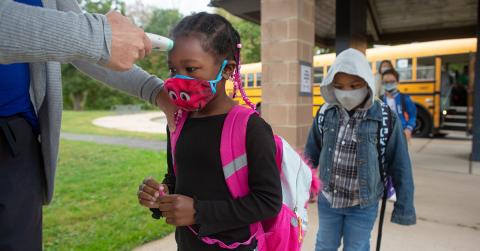
Photo by Allison Shelley for American Education: Images of Teachers and Students in Action
The U.S. Supreme Court — now with a full slate of justices — has just heard a case to overturn the Affordable Care Act (ACA) that the Trump administration supports. In addition to robbing 23 million Americans of health care coverage, eliminating the ACA would threaten a critical and long-term consequence that is largely overlooked: the demise of the Children’s Health Insurance Program (CHIP).
But Congress — even in its “lame duck” session — has a grand opportunity to prevent this.
CHIP provides 10 million children a year with child-specific health care such as pediatricians and children’s hospitals, which sometimes go missing from typical insurance plans. Aimed at families who earn too much to qualify for Medicaid but too little to afford private health insurance, CHIP is one of the most effective and affordable mechanisms for providing care to our country’s kids.
Ironically, CHIP is also the only federal health insurance program that is subject to the continuous threat of expiration. During its two-decades of existence, CHIP has repeatedly been subject to high-stakes political gamesmanship and “hostage taking” by an ever-more dysfunctional Congress. For instance, in 2017, Congress actually allowed the program to expire — for more than four months — endangering the health care of millions of children, including those undergoing treatment for cancer and other serious illness.
Eleven-year-old Roland, a lung cancer patient, was one of them. His mom, Myra Gregory, described the family’s outrage and anxiety in the St. Louis Post-Dispatch, writing:
“… I cannot understand…how the U.S. Congress could make the health security of kids like Roland a guessing game, and their lives bargaining chips…I have always known that our situation could get worse, but I never imagined that Congress would be an obstacle in my son’s battle with cancer.”
We do not allow — and would never put up with — the expiration of Medicare, health coverage for veterans, tax credits for private health insurance, or insurance for members of Congress. So why do we repeatedly risk the health of 10 million of our children? Simple fairness dictates that we should treat them at least as well as our seniors, veterans, and lawmakers.
The bipartisan “Comprehensive Access to Robust Insurance Now Guaranteed (CARING) for Kids Act” (H.R. 6151) would do just that. The bill would permanently authorize CHIP’s health coverage and contingency funding; express lane eligibility option; outreach and enrollment grants; and other provisions that make CHIP so successful and cost-effective. Simply put, it would make CHIP permanent. But time is running out.
The fight over the ACA is unfolding in the middle of a global pandemic. And against a grim backdrop: The U.S. Census Bureau recently reported that the number of U.S. children without health insurance rose for the third year in a row, hitting 5.7% in 2019. Hispanic children registered the greatest loss of insurance by far, up a full percentage point to 9.2%, the highest among any race or ethnic group. Georgetown University’s Center for Children and Families estimates that an additional 300,000 children have become uninsured since the beginning of 2020.
If the Court decides to repeal the ACA, it will impact millions of children directly: more than 17 million children with pre-existing conditions would be denied coverage, and children with serious illnesses — like Roland — would quickly exhaust their annual and lifetime coverage limits. The repeal would also take Medicaid from former foster youth between 18- and 26-years-old and purge others in that age group from their parents’ health insurance plans. The 10 million children enrolled in CHIP would become collateral damage.
Congress calculates the cost of CHIP and other federal programs using arcane “scoring” practices that arrive at relative costs by using offsets from other programs. Abolishing the ACA could radically alter the “scoring” of CHIP, making its future extension nearly impossible.
Such toxic uncertainty undermines the health — and future — of the program and the families it is meant to protect. It alarms parents and forces pediatricians to devise contingency plans for children on treatment regimens. During the 2017 expiration, many states suspended enrollment activities, forced to focus instead on what to do if the program vanished. The result of this uncertainty could not be clearer: The 2017 episode helped increase the percentage of uninsured children for the first time in more than two decades. And declines in coverage have continued every year since.
Congress must immediately make CHIP permanent by passing the bipartisan CARING Act and must also prepare to protect the ACA from harmful interventions by the Supreme Court.
This post was originally published on FirstFocus.org.

The views and opinions expressed in this post are those of the author(s) and do not necessarily reflect those of MomsRising.org.
MomsRising.org strongly encourages our readers to post comments in response to blog posts. We value diversity of opinions and perspectives. Our goals for this space are to be educational, thought-provoking, and respectful. So we actively moderate comments and we reserve the right to edit or remove comments that undermine these goals. Thanks!